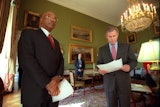WASHINGTON, D.C. — HBCUs and the online learning community need to become “more married” to reach more African-American students and reverse the United States’ continual slippage from its former position as the most degreed nation in the world.
That was the heart of the message delivered Thursday by Dr. John Wilson, executive director of the White House Initiative on Historically Black Colleges and Universities.
“We need a quality-based game-changer, and online education can help,” Wilson told an audience of about 50 during his keynote speech at the 2011 United States Distance Learning Association Public Policy Forum.
Wilson noted that of the 105 HBCUs throughout the nation, fewer than 20 have online degree programs.
“We definitely need to strengthen the HBCUs infrastructure in this regard, and we have a lot of work to do in order to strengthen the infrastructure since so few of our HBCUs have online degree programs,” Wilson said.
But while Wilson said “the marketplace is ripe” for online education at HBCUs, an expert on online learning at HBCUs said there’s a reason why so few HBCUs have online degree programs.
Dr. Roy Beasley, director of Howard-Online at Howard University, said while online education is popular with adults who are continuing their education and need flexibility in their academic programs, HBCUs still primarily serve traditional campus-based students, and, thus, the demand for online education has not seen significant growth.
Beasley, who attended the forum and Wilson’s talk, also said that among the HBCUs that have online programs, most are public universities that have mandates to provide education to all segments of the population.
“Another problem that HBCUs have is (online degree programs) cost money to develop,” said Beasley, who runs the Digital Learning Lab, a website devoted to distance learning at HBCUs.
Dr. Wilson, in an interview following his speech, said he has been told similar things by HBCU leaders.
“The first answer is, ‘Well, we don’t have the money to do that,’” Wilson said. “The next response is, ‘We don’t have the expertise.’
Eventually, he said, the conversation turns to the issue of “competing priorities.”
But Wilson noted that it’s not as if HBCUs are completely devoid of distance learning. More than half, he said, offer online courses.
By offering degrees online, Wilson said, the HBCUs could boost their graduation rates and capture more of the students who are turning to for-profit colleges for post-secondary education.
In his keynote address, Wilson outlined several ways in which he said college and university leaders “need to think differently about how online education” figures into their work and the Obama administration’s push for a “surge” in degree attainment.
“First is online learning can help us think differently about accountability,” Wilson said, explaining that the calls for accountability that started in the K-12 arena are now being made more frequently in the higher education arena.
For example, he said, Massachusetts has implemented a funding scheme where some colleges will get awarded money based on how well they boost academic performance and close achievement gaps as opposed to how many students they enroll.
With such accountability measures being put in place, the online learning community needs to figure out how it can play a bigger role in the area of accountability, he noted.
“Too many of our institutions are not student-ready,” Wilson said. “We still have industrial-era campuses, curriculums and pedagogies to prepare students for a digital economy, and that does not fit.”
Wilson also said online or distance learning can help the nation think differently about college completion in general and in particular the Obama administration’s goal to have the United States have the most college-educated and diverse workforce in the world by 2020.
Online learning, he said, can help universities implement strategies recommended by the Obama administration for colleges and universities to use data to drive decision-making, accelerate learning, reduce costs and target adults.
“To me that says ‘online, online, online,’” Wilson said.
Wilson noted that African-Americans are more likely than any other group to start college but not finish with a degree, with 35 percent falling into this category.
If the distance learning community and HBCUs get together, he said, more can be done to bridge the divide.
“The for-profits enroll about 150,000 more African-American students than HBCUs,” Wilson said. “There is no question that there is an appetite for this vehicle of learning. It’s already there. We see it, therefore, as an opportunity.”















